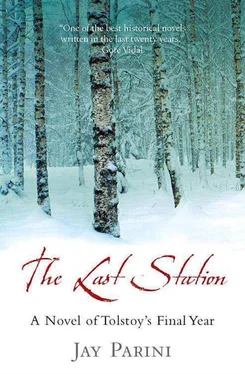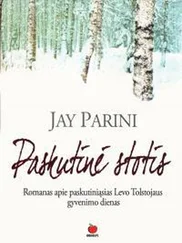‘The machine age is upon us,’ Leo Nikolayevich said.
‘It’s disgusting, isn’t it?’ I responded.
‘I suppose I shall not live to see airplanes,’ he said, pointing to a small group of children who had gathered about us. ‘But they certainly shall. I would rather see them till the soil.’
That night, he looked me in the eyes. ‘Automobiles, in Russia! There are people who have no shoes, and here are automobiles costing twelve thousand rubles! It’s filthy.’
I agreed, saying it would lead to revolution, and Leo Nikolayevich nodded. He believes that violent revolutions can only result in chaos, hence in worse conditions for the poor than now exist. This opinion, though correct, does not sit well with the revolutionary types who clog the entrance to his house each morning. No wonder the police lurk about the estate.
The situation at Yasnaya Polyana is desperate. Thank goodness we shall leave tomorrow to visit the Sukhotins at Kochety. Leo Nikolayevich loves his daughter Tanya, even though she has married that fractious bore and abandoned her father’s precepts. He is eager to get away quickly, before Sofya Andreyevna returns from Moscow, where she has been indulging herself for several weeks. Delightful weeks for us, I should say. Everyone is much happier when she is away from Tula. Alas, she suspects as much, and is rarely gone. A pity.
We were taken to the station today at half past seven in a troika. I have rarely felt so cheerful, and Leo Nikolayevich seemed alert and well. I checked his pulse several times, and it was normal.
Bulgakov met us at the Zasyeka Station with a small group of Tolstoyans – young Masha, Boulanger, Sergeyenko, and several others. A photographer hovered near us, clicking his contraption. Leo Nikolayevich seemed not to notice. Fortunately, we had to wait only a quarter of an hour before the train wheezed into the dock, steaming from all sides like an overworked horse.
A group of schoolboys emerged from a third-class carriage, shouting, ‘Count Tolstoy! Count Tolstoy!’ We pushed through them with difficulty. Leo Nikolayevich always insists on riding in third class, but today it was full. The conductor led us to a second-class carriage, a situation that clearly upset Leo Nikolayevich, who cannot tolerate a change in plans. We settled on pleasant benches covered with soft, blue cushions, but Leo Nikolayevich insisted that we or the conductor had conspired to seat him in a better carriage. This was simply not true.
At the fourth stop third-class space became available, and everyone was relieved. There are no seats in third class, so we moved a wicker basket near the window for Leo Nikolayevich to sit on and look out. He was so happy that he hummed to himself for much of the journey.
We had brought several newspapers with us, and one of them, New Russia , had excerpted a passage from For Every Day . This thrilled young Bulgakov, who insisted on reading it aloud. ‘Suffering and torment,’ he thundered above the clattering rails, ‘are experienced only by those who have separated themselves from the life of the world and, not seeing their own sins which have brought suffering into the world, consider themselves guiltless; consequently they rebel against the suffering they bear for the sins of the world and for their own spiritual well-being.’
Frankly, I did not understand a word of it. Philosophy has never been my strong suit. I am a practical man.
Leo Nikolayevich said, ‘This is what I have felt so keenly about myself. It is especially true if one lives a longish life, as I have.’ After a few moments, he added, ‘Too long, in fact! It’s a great misfortune to outlive one’s interest even in oneself.’
At each stop we disembarked to walk about the station. An old man gets very stiff between stops, so these ambulations are a necessity for Leo Nikolayevich. There was also the matter of relieving his bladder. I worry when he does not urinate frequently or properly. Infections can be lethal in a man of his age.
At one station, Leo Nikolayevich pointed to a policeman and whispered in my ear, ‘Look! a typical policeman’s face!’
‘In what way?’
‘Just look at him.’
I strolled past the man, pretending to mind my own business. He looked like most policemen: fat faced, full of jowl, but good-natured in appearance. It was a little embarrassing, but Leo Nikolayevich kept staring at me, as if to say, ‘Well? Was I correct?’ I nodded, and he broke into spasms of laughter.
I cannot understand him sometimes.
The conductor behaved badly, spreading word at each stop that Tolstoy was aboard. As a result, voyeurs pushed their noses against the window, ogling. A few would shout, ‘How are you, Leo Nikolayevich?’ and he would remove his hat in response.
At one station, a man rushed up to him and said, ‘Tolstoy!’
‘Not really,’ he replied. The imp danced in his old, gray eyes.
‘Not really?’ the man said.
‘Not really,’ Leo Nikolayevich repeated.
The man begged his pardon and withdrew, looking perplexed.
A telegram had been sent to Chertkov, asking him to seek permission from the government to visit Leo Nikolayevich at Kochety. During our last visit there, Chertkov had stayed four versts away, in Suvorovo, which is not in the province of Tula but in Orel. Leo Nikolayevich adored the irony of this situation, which reminded him of the exiled Voltaire, who constructed a castle in Ferney in such a way that his drawing room was in France but his bedroom in Switzerland. I, personally, find such connivances disagreeable. One should obey – or consciously disobey – the spirit as well as the letter of the law.
We changed trains at Orel, where there was an hour’s layover. Our baggage was carried to a small room off the first-class buffer, where I heated up some oatmeal porridge for Leo Nikolayevich, who had not eaten anything all day but a bit of stale bread that he carried in his pocket. Asparagus is in season, to my delight. It is especially good for clearing an old man’s urine. I asked for a dish of freshly steamed tips; when it arrived, it was nearly time for our departure. I complained to the station manager, who said I could take the dish with me.
Bulgakov led Leo Nikolayevich down the long platform to our carriage, followed by thirty or forty spectators. Leo Nikolayevich sat in the window of the third-class carriage once again, nibbling the slightly undercooked rusks. A young boy pressed his nose to the window, staring more at the asparagus than at Leo Nikolayevich, who insisted that I pass several rusks to the boy through the window. Taking them, the boy scurried off to eat them in private like a dog.
I overheard a man speaking to the conductor: ‘So the great Count eats asparagus!’ He spoke with a contemptuous note in his voice. ‘Who would have guessed? Asparagus!’ he said again.
I wanted to confront the fellow for his insolence, but I decided not to call attention to the issue. It would have been too painful for Leo Nikolayevich, who prefers to ignore slights and insults.
Late in the day we arrived at Blagodatnoye Station, where Tanya stood on the platform, waving her parasol like a figure in a French Impressionist painting. She was beautifully dressed, a real countess. Her father’s entire being came alive when he saw her. They embraced like children, with tears moistening their cheeks.
Tanya took us to Kochety, some fifteen versts from the station, in a plush droshky drawn by four black horses. The sun stood on the horizon’s edge, red and sharp. We had to shield our eyes.
Though he has often visited here, Leo Nikolayevich seemed enchanted by everything, remarking on the cool, green fields on either side of the road, the well-kept farms, the colorful dresses worn by women in the local villages. As it was Sunday, people were decked out in their finest. Leo Nikolayevich smiled almost continuously, exposing his red gums.
Читать дальше












